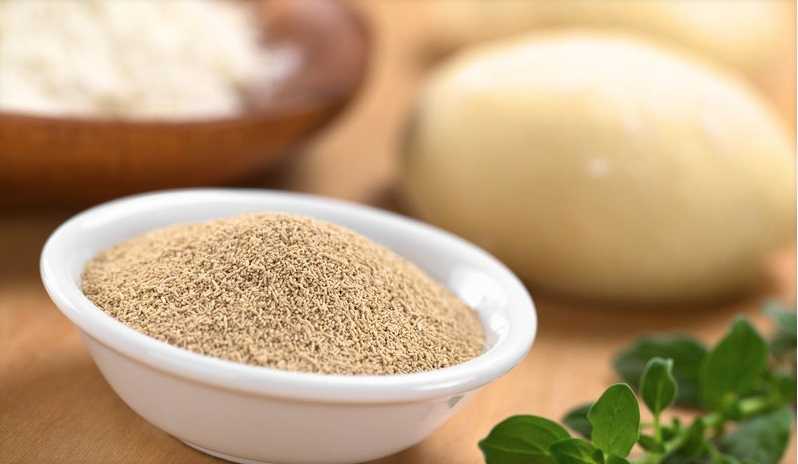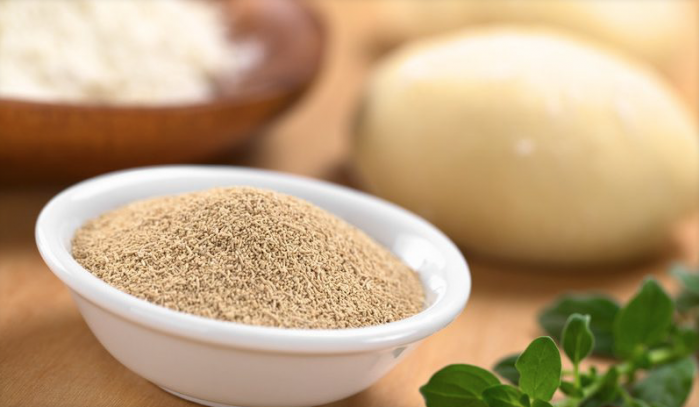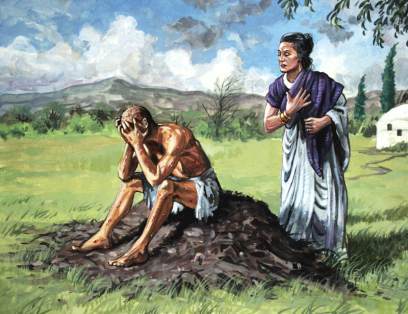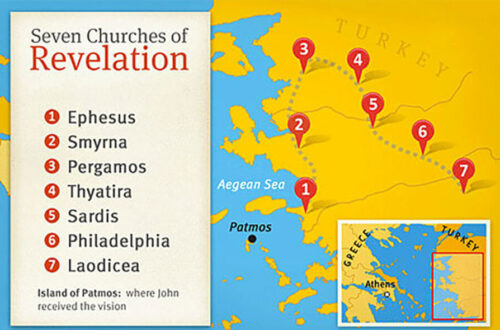
The Old Leaven of the Kingdom of Darkness
Generally, leaven represents sin in the Bible. Consequently, most offerings contained no leaven because unleavened bread represented Jesus in His perfect, sinless life in the flesh.
The Old Leaven of the Kingdom of Darkness

No grain offering, that would be offered on the altar, could contain leaven or yeast.
“ ‘No grain offering which you present to the Lord can be made with yeast, for you must not offer up in smoke any yeast or honey as a gift to the Lord. You can present them to the Lord as an offering of first fruit, but they must not go up to the altar for a soothing aroma. (Leviticus 2:11–12 NET)
Generally, leaven represents sin in the Bible. Consequently, most offerings contained no leaven because unleavened bread represented Jesus in His perfect, sinless life in the flesh. Jesus committed no sin (1 Peter 2:22), had no sin within Himself (1 John 3:5), and never knew sin (2 Corinthians 5:21); therefore, He being without blemish and spot, qualified to be our sacrificial offering (1 Peter 1:19).
Jesus warned his disciples of three dangerous forms of leaven:
The Pharisaical Leaven of Hypocrisy
Meanwhile, when many thousands of the crowd had gathered so that they were trampling on one another, Jesus began to speak first to his disciples, “Be on your guard against the yeast of the Pharisees, which is hypocrisy. (Luke 12:1 NET)
The term hypocrite originated in Greek drama and means to “put on the face.” The hypocrite was an actor in a play. He pretended to be something that he was not. The Pharisee pretended to be spiritual as he paraded his giving, praying, and fasting (Matthew 6). They were actors on the stage of life! All of their good works were done to be “seen of men” (Matthew 23:5). Christ warned his disciples to “beware” of this leaven by making sure their inside was as good as their outside:
Then Jesus said to the crowds and to his disciples, “The experts in the law and the Pharisees sit on Moses’ seat. Therefore pay attention to what they tell you and do it. But do not do what they do, for they do not practice what they teach. They tie up heavy loads, hard to carry, and put them on men’s shoulders, but they themselves are not willing even to lift a finger to move them. They do all their deeds to be seen by people, for they make their phylacteries wide and their tassels long. They love the place of honor at banquets and the best seats in the synagoguesand elaborate greetings in the marketplaces, and to have people call them ‘Rabbi.’ (Matthew 23:1–7 NET)
“Woe to you, experts in the law and you Pharisees, hypocrites! You clean the outside of the cup and the dish, but inside they are full of greed and self-indulgence. Blind Pharisee! First clean the inside of the cup, so that the outside may become clean too! “Woe to you, experts in the law and you Pharisees, hypocrites! You are like whitewashed tombs that look beautiful on the outside but inside are full of the bones of the dead and of everything unclean. In the same way, on the outside you look righteous to people, but inside you are full of hypocrisy and lawlessness. (Matthew 23:25–28 NET)
The Pharisees created laws contrary to God’s Word to benefit themselves and used them to control the people.
Hypocrites! Isaiah prophesied correctly about you when he said, ‘This people honors me with their lips, but their heart is far from me, and they worship me in vain, teaching as doctrines the commandments of men.’ ” (Matthew 15:7–9 NET)
Thus you nullify the word of God by your tradition that you have handed down. And you do many things like this.” (Mark 7:13 NET)
The Liberal Leaven of the Sadducee
“Watch out,” Jesus said to them, “beware of the yeast of the Pharisees and Sadducees.” (Matthew 16:6 NET)
The Sadducees were the major ruling religious party of Christ’s day. They were very liberal with their handling of scripture, interjecting their own human reasoning into its interpretation. They thought that the archaic writings of scripture needed to be brought up to date with modern understanding.
They proposed a parable to Jesus in Matthew 22:23-30 to prove in their minds that there couldn’t possibly be any resurrection of the dead. “A woman married and was widowed seven times by seven brethren. In the resurrection, whose wife would she be?” Jesus simply corrected their reasoning with Scripture and told them they erred in two ways:
Jesus answered them, “You are deceived, because you don’t know the scriptures or the power of God. (Matthew 22:29 NET)
- Not knowing the Scripture – When the leaven of liberalism sets in, emphasis on the teaching, preaching, reading, memorizing, and studying Scripture is left off, causing God’s people to perish (Hosea 4:6).
- Not knowing the Power of God – The power of God is only known by believing in the Word of God. When you leave the ministry of the Word, you leave off the powerful object of our faith, the Word of God. (Hebrews 1:3. 1 Corinthians 2:4. 1 Thessalonians 1:5)
For I am not ashamed of the gospel, for it is God’s power for salvation to everyone who believes, to the Jew first and also to the Greek. For the righteousness of God is revealed in the gospel from faith to faith, just as it is written, “The righteous by faith will live.” (Romans 1:16–17 NET)
Consequently faith comes from what is heard, and what is heard comes through the preached word of Christ. (Romans 10:17 NET)
Now without faith it is impossible to please him, for the one who approaches God must believe that he exists and that he rewards those who seek him. (Hebrews 11:6 NET)
To purge out the leaven of liberalism in our lives, we need only to ask ourselves if we are obeying:
Trust in the Lord with all your heart, and do not rely on your own understanding. (Proverbs 3:5 NET)
The Worldly Leaven of Herod
And Jesus ordered them, “Watch out! Beware of the yeast of the Pharisees and the yeast of Herod!” (Mark 8:15 NET)
Herod the Great was the great builder of Israel and the darling of Rome. Herod’s followers the Herodians were wholly given to the Greek culture, the Roman power, and the politics of the times. They tried to trap Jesus by asking, “Is it lawful to give unto Caesar?” (Mark 12:14-17) “This present world”, in every age, has had its allures. Jesus knew his disciples were going to be tempted by the leaven of worldliness, and he prayed the following to His Father:
I am not asking you to take them out of the world, but that you keep them safe from the evil one. (John 17:15 NET)
If you belonged to the world, the world would love you as its own. However, because you do not belong to the world, but I chose you out of the world, for this reason the world hates you. (John 15:19 NET)
We are also instructed to be in the world but not of the world, not conformed to it.
Therefore I exhort you, brothers and sisters, by the mercies of God, to present your bodies as a sacrifice—alive, holy, and pleasing to God—which is your reasonable service. Do not be conformed to this present world, but be transformed by the renewing of your mind, so that you may test and approve what is the will of God—what is good and well-pleasing and perfect. (Romans 12:1,2 NET)
We are definitely not to be in love with the world.
Do not love the world or the things in the world. If anyone loves the world, the love of the Father is not in him, because all that is in the world (the desire of the flesh and the desire of the eyes and the arrogance produced by material possessions) is not from the Father, but is from the world. And the world is passing away with all its desires, but the person who does the will of God remains forever. (1 John 2:15–17 NET)
Adulterers, do you not know that friendship with the world means hostility toward God? So whoever decides to be the world’s friend makes himself God’s enemy. (James 4:4 NET)
Every believer has to make their decision to either chose God or the god of this world:
“No one can serve two masters, for either he will hate the one and love the other, or he will be devoted to the one and despise the other. You cannot serve God and money. (Matthew 6:24 NET)
Beware of the leaven of Herod by considering what happened to the apostle Paul’s hand-picked disciple, whose Christianity by appearance probably would have put ours to shame:
For Demas deserted me, since he loved the present age, and he went to Thessalonica. Crescens went to Galatia and Titus to Dalmatia. (2 Timothy 4:10 NET)
The Common Sin of the Three Leavens
The three leavens are commonly rooted in the sin of unbelief or the lack of faith as seen in the Pharisees, Sadducees, and Herod that polluted their teaching and lifestyle.
But the man who doubts is condemned if he eats, because he does not do so from faith, and whatever is not from faith is sin. (Romans 14:23 NET)
The Scribes, Pharisees, and Sadducees were jealous of Jesus and routinely attempted to entrap Him with their questions. They had no faith in Him, the living Word of God, or His words. They did not have God’s love in their hearts (John 5:42) and could not discern the times or who He was as faith works through love (Galatians 5:6). Rather than believing that Jesus was the promised Messiah by what He said and did in fulfillment of prophecies (Luke 7:20-23), they wanted a sign, a “magic show.” Jesus only gave them the sign of the prophet Jonah:
But he answered them, “An evil and adulterous generation asks for a sign, but no sign will be given to it except the sign of the prophet Jonah. For just as Jonah was in the belly of the huge fish for three days and three nights, so the Son of Man will be in the heart of the earth for three days and three nights. (Matthew 12:39–40 NET)
Now when the Pharisees and Sadducees came to test Jesus, they asked him to show them a sign from heaven. He said, “When evening comes you say, ‘It will be fair weather, because the sky is red,’ and in the morning, ‘It will be stormy today, because the sky is red and darkening.’ You know how to judge correctly the appearance of the sky, but you cannot evaluate the signs of the times. A wicked and adulterous generation asks for a sign, but no sign will be given to it except the sign of Jonah.” Then he left them and went away. (Matthew 16:1–4 NET)
After this confrontation, Jesus immediately left and went across the lake with His disciples. The disciples became anxious about how they would provide food to feed His followers. Recall they had witnessed Jesus’ miracle of the multiplication of the bread on two previous occasions, once for Jews (i.e., the feeding of the 5000, Matthew 14:13-21. Mark 6:30-44. Luke 9:10-17. John 6:1-13) and the other time for Gentiles (i.e., the feeding of the 4000, Matthew 15:32. Mark 8:1-3). Jesus attempted to help them see their “lack of faith” and used the recent confrontation with the Sadducees and Pharisees and their “lack of faith” with the two feedings to provide a case study.
When the disciples went to the other side, they forgot to take bread. “Watch out,” Jesus said to them, “beware of the yeast of the Pharisees and Sadducees.” So they began to discuss this among themselves, saying, “It is because we brought no bread.” When Jesus learned of this, he said, “You who have such little faith! Why are you arguing among yourselves about having no bread? Do you still not understand? Don’t you remember the five loaves for the five thousand, and how many baskets you took up? Or the seven loaves for the four thousand and how many baskets you took up? How could you not understand that I was not speaking to you about bread? But beware of the yeast of the Pharisees and Sadducees!” Then they understood that he had not told them to be on guard against the yeast in bread, but against the teaching of the Pharisees and Sadducees. (Matthew 16:5–12 NET)
Jesus warned the disciples to guard against the leaven or teaching of the Pharisees and Sadducees’ because it was not based on faith and therefore is sin. (Romans 14:23). Jesus instructed the disciples that they needed to have faith in Him and His words without the impurity of a lack of faith. The teaching of the Pharisees and Sadducees removed faith from the people because, like leaven, it permeated throughout the truth that came from what Jesus taught, the true bread from Heaven.
A little yeast makes the whole batch of dough rise! (Galatians 5:9 NET)
Your boasting is not good. Don’t you know that a little yeast affects the whole batch of dough? Clean out the old yeast so that you may be a new batch of dough—you are, in fact, without yeast. For Christ, our Passover lamb, has been sacrificed. So then, let us celebrate the festival, not with the old yeast, the yeast of vice and evil, but with the bread without yeast, the bread of sincerity and truth. (1 Corinthians 5:6–8 NET)
The Apostle Paul, like Jesus, was not talking about physical bread, but rather that we are to live a life filled with God’s truth received in faith.
Feasts, Festivals, and Important Occasions of the Biblical Covenants Series:
- The Feasts of Israel – Introduction
- The Feasts of Israel – Hebrew Calendars, New Moon, Sabbath Year, and the Jubilee Year
- The Feasts of Israel – Sabbath
– The Spring Festivals:
- The Feasts of Israel – Passover
- The Feasts of Israel – Unleavened Bread
- The Feasts of Israel – Firstfruits
- The Feasts of Israel – Weeks (Pentecost)
– Seven Church Conditions during the Church Age:
- Prologue
- Jesus the Messiah!
- The Legalistic Congregation (Ephesus)
- The Persecuted and Faithful Congregation (Smyrna)
- The Persecuted and Compromised Congregation (Pergamos)
- The Licentious Congregation (Thyatira)
- The Dying Congregation (Sardis)
- The “Canceled” and Faithful Congregation (Philadelphia)
- The Dead Congregation (Laodicea)
– The Fall Festivals:
- The Feasts of Israel – Trumpets
- The Feasts of Israel – The Day of Atonement(s)
- The Feasts of Israel – Booths (Tabernacles)
- The Feasts of Israel – Dedication (Hanukkah)
Biblical Typologies, Metaphors, & Similes Series:
- The Old Leaven of the Kingdom of Darkness
- The New Leaven of the Kingdom of Heaven
- Wine
- Water
- Finely Sifted (Wheat) Flour
- Frankincense
- Myrrh
- Anointing Oil
- Olive Oil
- Honey
- Salt
- Waving and Heaving
- Barley
- Gold
- Silver
- Bronze
- Stone
- Wood
- Linen
- Iron
- Shofar and Trumpet
Shalom
(Peace, Wholeness, Success)
(1) Left-click on the underlined phrase to open another article in a different tab with more explanation.




